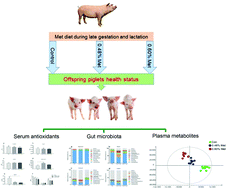当前位置:
X-MOL 学术
›
Food Funct.
›
论文详情
Our official English website, www.x-mol.net, welcomes your
feedback! (Note: you will need to create a separate account there.)
Effects of different methionine levels on offspring piglets during late gestation and lactation†
Food & Function ( IF 5.1 ) Pub Date : 2018-10-04 00:00:00 , DOI: 10.1039/c8fo01343h Md. Abul Kalam Azad 1, 2, 3, 4, 5 , Peng Bin 1, 2, 3, 4, 5 , Gang Liu 1, 2, 3, 4, 5 , Jun Fang 6, 7, 8, 9, 10 , Tiejun Li 1, 2, 3, 4, 5 , Yulong Yin 1, 2, 3, 4, 5
Food & Function ( IF 5.1 ) Pub Date : 2018-10-04 00:00:00 , DOI: 10.1039/c8fo01343h Md. Abul Kalam Azad 1, 2, 3, 4, 5 , Peng Bin 1, 2, 3, 4, 5 , Gang Liu 1, 2, 3, 4, 5 , Jun Fang 6, 7, 8, 9, 10 , Tiejun Li 1, 2, 3, 4, 5 , Yulong Yin 1, 2, 3, 4, 5
Affiliation

|
Maternal dietary supplementation during gestation and lactation improves the health of piglets. The purpose of this study was to determine the effect of different levels of methionine (Met) supplementation in the sows’ diet during late gestation and lactation on piglets. Thirty sows were randomly divided into three groups and fed the following diets from day 90 of gestation to day 21 of lactation: (a) control group (a basal diet containing 0.36% Met), (b) 0.48% Met group (a basal diet with additional 0.12% Met), and (c) 0.60% Met group (a basal diet with additional 0.24% Met). On day 21 after farrowing, piglets of average body weight (n = 10 per group) were selected for sample collection. The results showed that the 0.48% Met and 0.60% Met diets significantly lowered the malondialdehyde content in the piglets’ serum (P < 0.05). In addition, the glutathione peroxidase content was significantly increased in the 0.48% Met group (P < 0.05) and the total glutathione content was significantly reduced in the 0.60% Met group (P < 0.05) compared to the control group. Furthermore, Met supplementation of the sows’ diet was associated with alterations in 37 plasma metabolites in the piglets. In the piglets’ intestinal microbiota, the relative abundances of Phascolarctobacterium and Bacteroidetes in the 0.48% Met group were higher than those in the other two groups (P < 0.05). Our results suggest that a diet including 0.48% Met during late gestation and lactation can maintain the health of piglets by increasing the antioxidant capacity and changing the intestinal microbiota composition, but a higher level of Met supplementation may increase the potential risk to piglets.
中文翻译:

不同蛋氨酸水平对后期妊娠和哺乳期仔猪的影响†
孕期和哺乳期的母体饮食补充可改善仔猪的健康。这项研究的目的是确定在妊娠后期和哺乳期母猪日粮中添加不同水平的蛋氨酸(Met)对仔猪的影响。从妊娠第90天到哺乳第21天,将30头母猪随机分为三组,并饲喂以下日粮:(a)对照组(含0.36%Met的基础日粮),(b)0.48%Met组(基础日粮) (另加0.12%Met)和(c)0.60%Met组(基础饮食加0.24%Met)。分娩后第21天,平均体重的仔猪(n=每组10个)用于样本收集。结果表明,0.48%的蛋氨酸和0.60%的蛋氨酸饮食显着降低了仔猪血清中的丙二醛含量(P <0.05)。此外,与对照组相比,Met组0.48%的谷胱甘肽过氧化物酶含量显着增加(P <0.05),而Met组0.60%的谷胱甘肽过氧化物总含量显着降低(P <0.05)。此外,母猪日粮的蛋氨酸补充与仔猪中37种血浆代谢物的改变有关。在仔猪的肠道菌群中,杆菌属和拟杆菌属的相对丰度Met组的0.48%高于其他两组(P <0.05)。我们的结果表明,在妊娠后期和哺乳期饮食中添加0.48%的Met可以通过增加抗氧化能力和改变肠道菌群组成来维持仔猪的健康,但是更高的Met补充水平可能会增加仔猪的潜在风险。
更新日期:2018-10-04
中文翻译:

不同蛋氨酸水平对后期妊娠和哺乳期仔猪的影响†
孕期和哺乳期的母体饮食补充可改善仔猪的健康。这项研究的目的是确定在妊娠后期和哺乳期母猪日粮中添加不同水平的蛋氨酸(Met)对仔猪的影响。从妊娠第90天到哺乳第21天,将30头母猪随机分为三组,并饲喂以下日粮:(a)对照组(含0.36%Met的基础日粮),(b)0.48%Met组(基础日粮) (另加0.12%Met)和(c)0.60%Met组(基础饮食加0.24%Met)。分娩后第21天,平均体重的仔猪(n=每组10个)用于样本收集。结果表明,0.48%的蛋氨酸和0.60%的蛋氨酸饮食显着降低了仔猪血清中的丙二醛含量(P <0.05)。此外,与对照组相比,Met组0.48%的谷胱甘肽过氧化物酶含量显着增加(P <0.05),而Met组0.60%的谷胱甘肽过氧化物总含量显着降低(P <0.05)。此外,母猪日粮的蛋氨酸补充与仔猪中37种血浆代谢物的改变有关。在仔猪的肠道菌群中,杆菌属和拟杆菌属的相对丰度Met组的0.48%高于其他两组(P <0.05)。我们的结果表明,在妊娠后期和哺乳期饮食中添加0.48%的Met可以通过增加抗氧化能力和改变肠道菌群组成来维持仔猪的健康,但是更高的Met补充水平可能会增加仔猪的潜在风险。









































 京公网安备 11010802027423号
京公网安备 11010802027423号